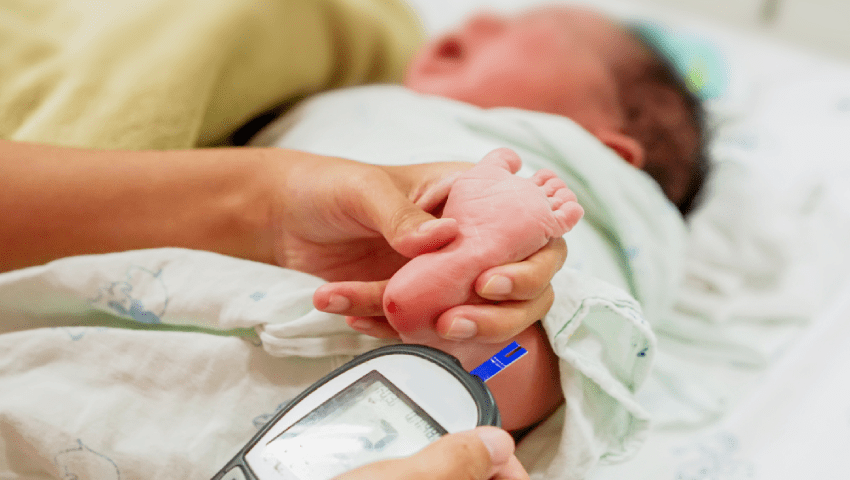
- 23/12/2024
- Goodfaith Healthcare
- 0 Comments
- Blogs
Newborn Screening Tests: A Lifesaving Start for Your Baby
Bringing a newborn into the world is a moment of immense joy and responsibility. As parents, ensuring the best possible start for your baby includes understanding the importance of newborn screening tests. These tests play a crucial role in detecting serious but treatable health conditions early, allowing for timely medical intervention that can significantly improve a child’s health and future.
What is Newborn Screening?
Newborn screening is a set of medical tests performed on infants shortly after birth. These tests help detect metabolic, genetic, and congenital disorders that may not be apparent at birth but can cause serious health complications if left untreated. Early identification and treatment can prevent disabilities, developmental delays, and even life-threatening conditions.
Why is Newborn Screening Important?
Many serious health conditions do not show immediate symptoms in newborns. Newborn screening helps in:
- Early Detection: Identifying potential health issues before symptoms appear.
- Timely Treatment: Starting early interventions to prevent complications.
- Improved Outcomes: Enhancing the quality of life and reducing long-term medical costs.
- Preventing Disabilities: Managing conditions before they lead to irreversible damage.
Common Newborn Screening Tests:
Blood Spot Test (Heel Prick Test):
- This test involves taking a few drops of blood from the baby’s heel to screen for metabolic and genetic disorders.
- Detects conditions such as Phenylketonuria (PKU), Congenital Hypothyroidism, Sickle Cell Disease, and Cystic Fibrosis.
Hearing Screening:
- Conducted using special devices that measure the baby’s response to sound.
- Helps detect congenital hearing loss, allowing early intervention such as hearing aids or cochlear implants.
Congenital Heart Disease (CHD) Screening:
- Uses pulse oximetry to measure oxygen levels in the blood, identifying critical congenital heart defects.
- Early detection ensures timely medical or surgical treatment to prevent complications.
Jaundice Screening:
- Measures bilirubin levels to assess the risk of severe jaundice, which can lead to neurological complications if untreated.
Newborn Metabolic and Genetic Testing:
- Includes tests for rare metabolic disorders like Galactosemia, Maple Syrup Urine Disease, and Biotinidase Deficiency.
- Helps in preventing developmental issues through diet modifications or medication.
How are Newborn Screening Tests Performed?
Newborn screening tests are quick, simple, and painless procedures performed within 24 to 48 hours after birth. Blood tests involve a small prick on the baby’s heel, while hearing and heart screenings are non-invasive and performed using specialized equipment.
What Happens If a Test is Positive?
A positive screening result does not always mean the baby has a disorder but indicates the need for further diagnostic tests. If a condition is confirmed, doctors will initiate treatment plans, including medication, dietary changes, or other medical interventions to ensure the baby’s well-being.
Newborn Screening in India: What Parents Should Know:
While newborn screening is mandatory in many developed countries, awareness and implementation in India are still evolving. Some private hospitals and pediatric specialists recommend comprehensive newborn screening to ensure early detection of health conditions. Parents should inquire about available tests and opt for expanded screening if possible.
Expert Pediatric Care for Your Newborn:
Dr. Anuja Chougule Pakhare, a highly skilled Pediatrician and Neonatologist at Goodfaith Healthcare Clinic in Hinjewadi, specializes in comprehensive newborn and pediatric care. With over a decade of experience, she ensures that newborns receive the best start in life through early screenings, timely interventions, and personalized medical care.
Conclusion:
Newborn screening tests are a simple yet powerful way to safeguard your baby’s health from the very beginning. By detecting hidden health conditions early, these tests provide an opportunity for timely treatment and a healthier future. As a parent, being informed and proactive about newborn screening can make a lifesaving difference for your child.
If you have any questions about newborn screening, consult with an experienced pediatrician like Dr. Anuja Pakhare to ensure the best care for your newborn.
